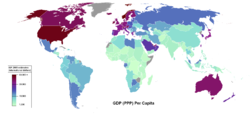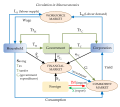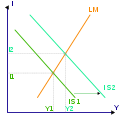The Solow–Swan model or exogenous growth model is an economic model of long-run economic growth. It attempts to explain long-run economic growth by looking...
35 KB (4,942 words) - 13:50, 13 May 2025
the development of the Solow–Swan model. The model was developed separately and independently by Robert Solow and Trevor Swan in 1956, in response to...
59 KB (8,195 words) - 23:21, 4 March 2025
Economic growth (redirect from Economic growth models)
Vishny. Robert Solow and Trevor Swan developed what eventually became the main model used in growth economics in the 1950s. This model assumes that there...
128 KB (15,049 words) - 19:23, 15 May 2025
extensions by David Cass and Tjalling Koopmans in the 1960s. The model extends the Solow–Swan model by endogenizing the savings rate through explicit microfoundations...
27 KB (3,778 words) - 19:15, 10 May 2025
academic dialogue that led to the development of the Solow–Swan model. According to the Harrod–Domar model there are three kinds of growth: warranted growth...
11 KB (1,431 words) - 03:38, 23 January 2025
Winchester Swan (14 January 1918 – 15 January 1989) was an Australian economist. He is best known for his work on the Solow–Swan growth model, published...
6 KB (709 words) - 02:49, 31 March 2025
Solow's model of economic growth, often known as the Solow–Swan neoclassical growth model as the model was independently discovered by Trevor W. Swan...
38 KB (3,162 words) - 23:40, 8 May 2025
Growth model can refer to: Population dynamics in demography Economic growth Solow–Swan model in macroeconomics Fei-Ranis model of economic growth Endogenous...
343 bytes (72 words) - 16:17, 1 March 2018
steady state level of the growth of consumption, as for example in the Solow–Swan model. Although the concept can be found earlier in the work of John von...
13 KB (1,854 words) - 19:49, 2 August 2023
)[\ln(A(t))]+\varepsilon .\,} Breton estimates the Solow residual for the human capital-augmented version of the Solow-Swan model over the 20th century. He finds that...
16 KB (2,567 words) - 06:30, 20 September 2024
Endogenous growth theory (redirect from Endogenous growth model)
such as the Solow–Swan model. They favored a model that replaced the exogenous growth variable (unexplained technical progress) with a model in which the...
13 KB (1,464 words) - 19:55, 14 October 2024
Productivity paradox (redirect from Solow computer paradox)
banking, airline, hotel, and rental car reservations, to name a few. Solow–Swan model General-purpose technology Productivity-improving technologies Brynjolfsson...
26 KB (3,087 words) - 01:26, 15 May 2025
Macroeconomics (section IS–LM model)
growth models like the Solow–Swan model, the Ramsey–Cass–Koopmans model and Peter Diamond's overlapping generations model. Quantitative models include...
66 KB (7,913 words) - 21:19, 16 May 2025
incomes will tend to grow at faster rates than richer economies. In the Solow-Swan model, economic growth is driven by the accumulation of physical capital...
13 KB (1,763 words) - 20:03, 28 September 2024
Solow-Swan assumptions while the Southern economy is operating under Lewis growth assumptions. However, for the purposes of simplicity of this model,...
6 KB (867 words) - 20:58, 20 October 2024
economy. Cobb–Douglas model of production Solow–Swan model of economic growth Lucas islands model of money supply Heckscher–Ohlin model of international trade...
30 KB (3,862 words) - 16:59, 24 September 2024
attention to formal education rather than learning-by-doing. While in Solow-Swan model human capital is constant which leads to no transitional dynamics,...
4 KB (344 words) - 11:22, 11 December 2023
effects. A similar argument was introduced by economist James Tobin. Solow–Swan model Mundell, R. (1963). "Inflation and Real Interest". Journal of Political...
1 KB (153 words) - 17:03, 16 August 2017
economic growth" Harvard University Massachusetts Institute of Technology Solow–Swan model 1988 Maurice Allais (1911–2010) France "for his pioneering contributions...
70 KB (2,020 words) - 12:21, 12 May 2025
of the Philippines Asian Center (1980–1985). Robert Solow, 99, American economist (Solow–Swan model), Nobel Prize laureate (1987). Alexei Starobinsky,...
216 KB (15,969 words) - 21:26, 24 April 2025
In the model, economic growth was unstable. The Solow–Swan model that followed several years later borrowed heavily from the Harrod-Domar model and used...
8 KB (815 words) - 00:24, 21 December 2024
of the Variance-gamma distribution Trevor Swan – economist best known for his work on the Solow-Swan Model Justin Wolfers – economist of Wharton School...
59 KB (5,447 words) - 05:12, 11 May 2025
Shepherd, J. (July 1975). "On the Asymptotic Solution of the Lagerstrom Model Equation". SIAM Journal on Applied Mathematics. 29 (1): 110–120. doi:10...
39 KB (2,106 words) - 11:22, 15 March 2025
is no more microfounded than simpler models such as the Solow–Swan model. As long as a macroeconomic growth model assumes an excess demand function satisfying...
23 KB (3,025 words) - 13:33, 9 January 2024
extensive studies of long-run growth during the 1950s and 1960s. The Solow–Swan model, for example, established the primacy of technological progress in...
21 KB (1,980 words) - 21:32, 16 April 2025
American economist Robert Solow (1924–2023) and Australian economist Trevor Swan (1918–1989) proposed the Solow–Swan model, based on productivity, capital...
170 KB (19,880 words) - 21:24, 16 May 2025
Economic growth Solow–Swan model k ′ ( t ) = s [ k ( t ) ] α − δ k ( t ) {\textstyle k'(t)=s[k(t)]^{\alpha }-\delta k(t)} Ramsey–Cass–Koopmans model Dynamic stochastic...
13 KB (1,097 words) - 09:46, 23 January 2025
model, or Hicks–Hansen model, is a two-dimensional macroeconomic model which is used as a pedagogical tool in macroeconomic teaching. The IS–LM model...
29 KB (3,743 words) - 22:05, 20 February 2025
welfare model socioeconomics sole proprietorship A business owned and operated by one person. solidarity economy Solow residual Solow–Swan model...
229 KB (25,481 words) - 16:38, 24 March 2025
demand–aggregate supply model (also known as the aggregate supply–aggregate demand or AS–AD model) is a widely used macroeconomic model that explains short-run...
22 KB (2,850 words) - 04:14, 7 February 2025








